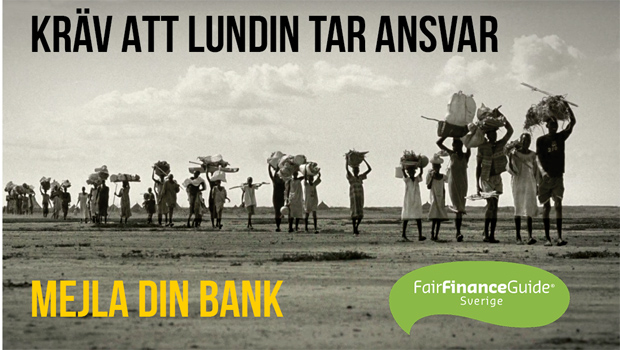Swedwatch and Fair Finance Guide, Sweden has published a report Fuel for Conflict – Investors and the Case of Lundin Petroleum in Sudan, on April 27, 2017. The report states that all companies have a responsibility to respect human rights in their business operations. For investors, this responsibility extends to the operations of the companies they invest in.
The report examines how Swedish banks and pension funds have responded to allegations that Lundin Petroleum contributed to the killing and displacement of thousands of people.
The seven biggest banks in Sweden and the Swedish government pension funds own Lundin shares worth 3.6 billion SEK (over 410 million USD). Most were invested at the time of the activities in Sudan and all but one have since been listed among Lundin’s biggest shareholders. Despite substantial information on how the oil industry was linked to human rights violations in Sudan, investors surveyed in the report claim that the evidence is insufficient.
This raise questions of how investors assess the impact of their business activities on human rights in the countries where their investments are held. When a shareholder proposal to initiate an independent investigation into the matter was presented at Lundin’s annual general meeting in 2012, only two of the shareholders surveyed in the report supported the proposal. Since the proposal did not gather enough votes, no investigation was initiated.
Investors state that they have acted on the allegations made against Lundin Petroleum through dialogue with the company. However, in some cases, this dialogue has been ongoing for more than ten years without producing any concrete results. Despite the severity of the accusations over the past decade, some investors only initiated direct dialogue with Lundin in 2012.
These are the recommendations for the investors in Lundin Petroleum:
- Conduct proper human rights due diligence regarding their investments in Lundin, focusing on the consequences of the operations in southern Sudan between 1997 and 2003. They should publicly communicate the activities and results of this process, in accordance with the UNGPs principle of “know and show”.
- Act on the findings of this process and address all adverse impacts on human rights that have arisen as a result of Lundin operations in Sudan between 1997 and 2003, then use their leverage to encourage Lundin to act in accordance with the UNGPs and address the impacts, be it through remediation or other means.
- Demand transparency and cooperation from Lundin when assessing and addressing adverse human rights impacts connected to the company’s operations in Sudan, through either investor due diligence or an independent investigation.
Fuel for conflict
Investors and the case of Lundin Petroleum in Sudan
April 2017
Download



